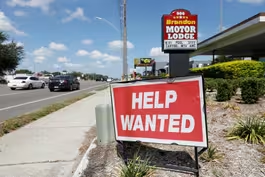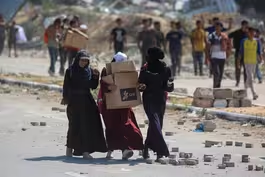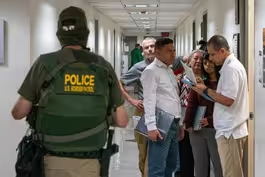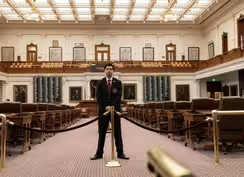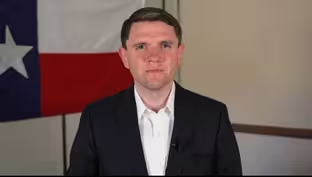
Beirut blast victims struggle as leaders evade blame
Clip: 8/4/2025 | 7m 35sVideo has Closed Captions
5 years after Beirut blast, victims struggle to rebuild lives as leaders evade blame
Five years ago, one of the largest non-nuclear explosions in history ripped apart Beirut's waterfront with a terrifying power. The blast, which many still refer to as "the bomb," was not terrorism, nor was it war. It was caused by issues that have plagued Lebanon for years, and still do: municipal incompetence and government corruption. Leila Molana-Allen reports.
Problems playing video? | Closed Captioning Feedback
Problems playing video? | Closed Captioning Feedback
Major corporate funding for the PBS News Hour is provided by BDO, BNSF, Consumer Cellular, American Cruise Lines, and Raymond James. Funding for the PBS NewsHour Weekend is provided by...

Beirut blast victims struggle as leaders evade blame
Clip: 8/4/2025 | 7m 35sVideo has Closed Captions
Five years ago, one of the largest non-nuclear explosions in history ripped apart Beirut's waterfront with a terrifying power. The blast, which many still refer to as "the bomb," was not terrorism, nor was it war. It was caused by issues that have plagued Lebanon for years, and still do: municipal incompetence and government corruption. Leila Molana-Allen reports.
Problems playing video? | Closed Captioning Feedback
How to Watch PBS News Hour
PBS News Hour is available to stream on pbs.org and the free PBS App, available on iPhone, Apple TV, Android TV, Android smartphones, Amazon Fire TV, Amazon Fire Tablet, Roku, Samsung Smart TV, and Vizio.
Providing Support for PBS.org
Learn Moreabout PBS online sponsorshipGEOFF BENNETT: Five years ago today, Beirut, Lebanon, sat shattered.
One of the largest non-nuclear explosions in history had ripped apart its waterfront with a terrifying power that registered well up the Richter scale.
The blast, which many still refer to as the bomb, was not terrorism, nor was it war.
It was caused by issues that have long plagued Lebanon for years and still do, municipal incompetence, government corruption, and a perceived indifference among local leaders.
Now, years later, as Leila Molana-Allen reports, the outlook for Beirut is, if anything, more dire.
LEILA MOLANA-ALLEN: A single moment that changed the face of a city and its people.
At 6:08 p.m. on August 4, 2020, 2,750 tons of ammonium nitrate exploded in the Port of Beirut, ravaging 12 miles of the city.
It was the third largest non-nuclear explosion in history.
Issam's 38-year-old brother, Abdo, died that day.
Issam thought it was the end for him too.
Moments after the blast, as he pulled shards of shattered window from his face, his entire apartment building collapsed on top of him.
ISSAM ATAH, Brother of Blast Victim: I woke up eight minutes after.
I had -- I tasted the blood.
And both of my legs were stuck.
LEILA MOLANA-ALLEN: The government did little to respond.
Beirutis and Lebanese volunteers from across the country rushed to help.
Issam was trapped under the rubble of his home for 17 hours before being rescued.
ISSAM ATAH: I was in pain, but the only thing that made me survive the 17 hours was the people that I was surrounded by.
Whoever lived nearby, they came to give some help.
LEILA MOLANA-ALLEN: With extensive rehabilitation, he can now walk a short way with limited movement in his left leg.
Running is a distant dream, but it's the loss of his beloved brother he can't move past.
ISSAM ATAH: Abdo was a loving person.
He was smart.
He was the cool guy.
He was -- he didn't have any hatred.
He was generous, just the guy that you can talk anything with.
We still didn't process the space.
For me, he always walks with me unseen, unheard.
And, yes, he's always with me.
LEILA MOLANA-ALLEN: Rising from the ashes of the port, Beirut's mighty grain silos are still standing.
They were built to keep the nation fed, but saved Beirutis in a different way.
The vast cement cylinders blocked the worst of the blast from hitting the west of the city.
The east was devastated.
The ruined silos have become a memorial to those who were lost.
The government has tried multiple times to tear them down, arguing they're unstable.
The families say it's to try and wipe away the visual scar on the city, the evidence of what was done to its people, they believe by their own leaders.
ISSAM ATAH: The survivors who are struggling to be treated, to get the medication and all that, they left with nothing.
We all come from different backgrounds, different religions, but we all stuck together.
And we're against politicians.
We're just Lebanese fighting for our rights.
LEILA MOLANA-ALLEN: Compounding the loss and lasting trauma is the sting of impunity.
Despite extensive evidence that multiple Lebanese governments knew the danger the fertilizer posed, and did nothing, the investigation into the blast has been blocked at every turn.
Five years on, no senior figures have been brought to justice, nor have the injured received compensation.
Nada Abdel Sater is a lawyer who's been campaigning for years for an independent international investigation into the blast.
NADA ABDEL SATER, Attorney: Corruption and negligence of the authorities were viewed to be the primary responsible, because they allowed an explosive, a nuclear bomb, so to speak, in the middle of the city, in the heart of the city.
LEILA MOLANA-ALLEN: Nada says she's now representing more than 1,000 victims and their families.
NADA ABDEL SATER: The system is broken because there are people breaking it.
It's because there are corrupt people and there is impunity.
It's time for impunity to stop.
It's time for the Lebanese people to live in freedom, in security.
LEILA MOLANA-ALLEN: For some of the victims, the torment they seek freedom from is that of their own minds.
We first met Nicole in August 2020, as her husband, Najee (ph), lay in hospital, waking from a coma.
NICOLE TORBAY-MAKHLOUF, Wife of Blast Victim: I went to the hospital.
It was really chaos there, doctors running, people screaming.
The hospital was really overflowing with death and wounded people.
LEILA MOLANA-ALLEN: Nearly 7,000 people were wounded in the explosion.
Najee was one of around 1,500 to sustain severe, life-changing injuries.
NICOLE TORBAY-MAKHLOUF: The moment I saw him, he was overflowing with blood everywhere.
LEILA MOLANA-ALLEN: The doctors said, while Najee would make a full physical recovery, brain damage meant he would likely suffer ongoing problems with cognition and motor skills.
NICOLE TORBAY-MAKHLOUF: He has a big damage on the frontal side of his brain, which means Najee lost all the sense of planning, of the emotion.
Najee cannot smell anymore.
The sense of tasting as well, he lost it.
He is a different version now.
LEILA MOLANA-ALLEN: Nicole was just happy her husband was coming home.
She didn't know the man coming back to her would be a different person.
NICOLE TORBAY-MAKHLOUF: Najee was a person full of life.
He was very different, now is silent.
He doesn't want to do anything.
Najee is not the husband that I married.
It has a big, huge impact on me and on my daughter's as well, because she had a hero at home and suddenly she has to live at -- with someone who is severely injured.
LEILA MOLANA-ALLEN: Nicole hasn't just been coping with the irreversible impact on her husband and daughter, Yasmina (ph), who was just 10 when the blast destroyed their home, but on their daily lives.
NICOLE TORBAY-MAKHLOUF: I feel really anger, really disgust.
They were gambling with our lives, and because they know that there is no justice in Lebanon.
They know that they are above the law.
They know that nobody will pursue them.
Sometimes, I feel like I'm screaming under the water and no one is listening.
LEILA MOLANA-ALLEN: With Najee still unable to work, medical and rebuilding costs have been debilitating.
And Nicole says the house means nothing when she's lost the souls of the people who made it a home.
NICOLE TORBAY-MAKHLOUF: August 4 is the day that split my life in two, before and after.
LEILA MOLANA-ALLEN: Pounded relentlessly for five years by the blast, economic crisis, political paralysis and war, peace has forgotten this city.
Those still bearing the scars pray they won't be forgotten too.
For the "PBS News Hour," I'm Leila Molana-Allen.
Amy Walter and Jasmine Wright on trust in institutions
Video has Closed Captions
Clip: 8/4/2025 | 8m 58s | Amy Walter and Jasmine Wright on Trump's BLS firing and trust in institutions (8m 58s)
Ex-Trump official: BLS firing undermines trust in key data
Video has Closed Captions
Clip: 8/4/2025 | 8m 41s | Firing of labor statistics head undermines trust in key data, ex-Trump official warns (8m 41s)
Gates Foundation pledges $2.5B for women’s health worldwide
Video has Closed Captions
Clip: 8/4/2025 | 6m 58s | Gates Foundation pledges $2.5B for women’s health worldwide (6m 58s)
News Wrap: 40 Gazans killed by Israeli gunfire, airstrikes
Video has Closed Captions
Clip: 8/4/2025 | 4m 51s | News Wrap: At least 40 Gazans killed by Israeli gunfire and airstrikes (4m 51s)
Priest says ICE targets migrants at immigration court
Video has Closed Captions
Clip: 8/4/2025 | 6m 48s | Jesuit priest describes seeing ICE agents target migrants at immigration court (6m 48s)
Texas Democrats leave state to stop GOP redistricting plan
Video has Closed Captions
Clip: 8/4/2025 | 3m 28s | Texas Democrats leave state to stop GOP's redistricting plan backed by Trump (3m 28s)
Trump is trying to 'insulate himself,' Texas Democrat says
Video has Closed Captions
Clip: 8/4/2025 | 5m 7s | Trump trying to 'insulate himself from the will of the public,' Texas Democrat says (5m 7s)
Providing Support for PBS.org
Learn Moreabout PBS online sponsorshipSupport for PBS provided by:
Major corporate funding for the PBS News Hour is provided by BDO, BNSF, Consumer Cellular, American Cruise Lines, and Raymond James. Funding for the PBS NewsHour Weekend is provided by...

